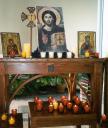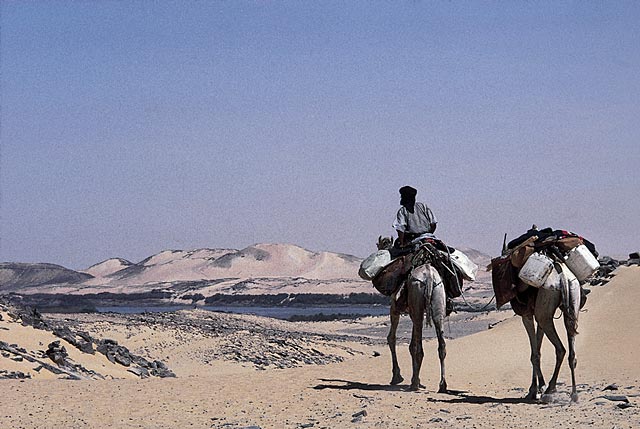“Pray with the gift of tears, so that through sorrowing you may tame what is savage in your soul…Prayer is the flower of gentleness and of freedom from anger. Prayer is the fruit of joy and thankfulness. Prayer is the remedy for gloom and despondency. ‘Go and sell all that you have and give it to the poor…deny yourself, taking up your cross.’ You will then be free from distraction when you pray. If you wish to pray as you should, deny yourself all the time, and when any kind of affliction troubles you, meditate on prayer.”
Category: Archive
Asceticism and/or Grace?
St. Makarios of Alexandria, who Tradition says was a successful merchant of fruits and pastries, left everything in 355 to be a monk. It is said about Makarios that ‘for seven years he lived on raw vegetables dipped in water with a few crumbs of bread, moistened with drops of oil on feast days.
It is also said that he once spent 20 days and 20 nights without sleep, burnt by the sun in the day, frozen by bitter desert cold cold at night. “My mind dried up because of lack of sleep, and I had a kind of delirium,” the hermit admitted. “So I gave in to nature and returned to my cell.”
If that was not enough, it is said that he spent six months naked in the marshes, attacked by blood-sucking flies and mosquitoes, in the hope of destroying his last bit of sexual desire. The terrible conditions and attacking insects left him so deformed that when he returned to the monks, they could recognize him only by his voice. It is also said that he had powers of healing.
The monastic and prophetic tradition are full of such things. ![]()
Even St. Benedict threw himself naked into a brier patch. Oh, and John the Baptist ate locusts.
What do we learn from ascetic practice? In a world of consumption and indulgence of all kinds, are these saints not living parables?
Fix the Roof or Change the World?
Or Both? (This is not our roof by the way!)
Our parish is in the proverbial (actually literal) ‘fix the roof’ situation; we have a roof in need of serious repair costing $92 thousand and at the same time we also have great potential for evangelical and justice ministry in our urban parish that has gone under resourced for far too long. We are just beginning to minster to African refugees just down the street, as an example.
What to do? The ‘boat’ is still in a ‘turnaround’ and I am not sure we’re healthy enough for a capital campaign. God seems to be saying ‘wait’ but the facility might not be able to (so what is God really saying?).
Wisdom from the neophytes wanted!
Isaac of Nineveh
Whenever I run into this quote I simply cannot resist posting it:
“Let yourself be persecuted, but do not persecute others.
Be crucified, but do not crucify others.
Be slandered, but do not slander others.
Rejoice with those who rejoice, and weep with those who weep: such is the sign of purity.
Suffer with the sick.
Be afflicted with sinners.
Exult with those who repent.
Be the friend of all, but in your spirit remain alone. Be a partaker of the sufferings of all, but keep your body distant from all.
Rebuke no one, revile no one, not even those who live very wickedly.
Spread your cloak over those who fall into sin, each and every one, and shield them.
And if you cannot take the fault on yourself and accept punishment in their place,
do not destroy their character.
What is a merciful heart? It is a heart on fire for the whole of creation, for humanity, for the birds, for the animals, for demons, and for all that exists. By the recollection of them the eyes of a merciful person pour forth tears in abundance. By the strong and vehement mercy that grips such a person’s heart, and by such great compassion, the heart is humbled and one cannot bear to hear or to see any injury or slight sorrow in any in creation. For this reason, such a person offers up tearful prayer continually even for irrational beasts, for the enemies of the truth, and for those who harm her or him, that they be protected and receive mercy.”
Is this the kind of mercy Jesus describes or is it ‘over the top?’
“God is kind to the ungrateful and the evil. Be merciful as your heavenly Father is merciful.”
Maybe this is the Third Way.
Repair the World תיקון עולם
 There is a Hebrew prayer, “Tikkun Olam” which is simply a request for God to ‘repair, fix or heal the world.’ There is an old Rabbinic Tale that says, in creation, the universe was unable to contain the Divine Light of God and therefore it cracked into pieces. Henceforth, the creation was imperfect and the goal of the Imago Dei, (humanity) is to bring the world to its perfection, to its completion, to its fullness.
There is a Hebrew prayer, “Tikkun Olam” which is simply a request for God to ‘repair, fix or heal the world.’ There is an old Rabbinic Tale that says, in creation, the universe was unable to contain the Divine Light of God and therefore it cracked into pieces. Henceforth, the creation was imperfect and the goal of the Imago Dei, (humanity) is to bring the world to its perfection, to its completion, to its fullness.
A tall order indeed. But isn’t this the work that Jesus has done? Aren’t we, his body, extentions of his work?
I am frustrated that so many Christians have given up healing and restoring this world. It is as if ‘the Kingdom of heaven is not at hand.’ But if the Kingdom has come upon us in the presence and work of Jesus, then Tikkum Olam is a prayer that can actually be answered. ‘The blind see, the dead walk, the poor have the Good News preached to them!’
I Love Idi Amin
I was reading through Luke 6 a couple of weeks ago and read two verses that I know I’ve read a thousand times before. Luke 6:35-36 says this, “But love your enemies, and do good, and lend, expecting nothing in return, and your reward will be great, and you will be sons of the Most High, for he is kind to the ungrateful and the evil. Be merciful, even as your Father is merciful.”
I guess I had never really seen ‘he is kind to the ungrateful and the evil‘ before. We usually look at kindness and loving others as something that has perks, or something that we do selectively. But Jesus seems to say otherwise. So what if you give cash to the guy with the sign and he looks at you with a ‘is that all?’ look. So what if someone acts entitled to your kindness or if they are outright cruel? ‘Be merciful as your Father is merciful’ even to the evil and ungrateful.
Fr. Festo Kivengere was one of the last persons to see Anglican Archbishop Luwan before Idi Amin killed him. Fr. Festo saw firsthand the brutality of the dictator. This dictator who brutally killed hundreds of thousands. Yet, when asked to talk about Amin’s regime, Fr. Festo wrote a book and called it, I Love Idi Amin. He says “When Jesus was on the cross, he said, ‘Father forgive them, for they do not know what they are doing.’ How could I do any less with Idi Amin?” Therefore he could say, ‘I love Idi Amin.’
I look at the current political wars in many of the mainline churches, especially the Episcopal Church that I am a part of. Yes, I am disappointed at the unwillingness to repent of various heresies and apostasy. And to abandon the Scriptures and the Tradition is grave indeed.
But is there another way besides schism and lawsuits and sword rattling? Do we who are doctrinally correct have the ‘right’ to sue and castigate our opponents?
If God is kind to the ungrateful and the evil and if someone can say ‘I love Idi Amin’ in the name of Jesus, can I love and pray for the leaders of TEC? Is it possible to show mercy as God shows mercy?
Is there a third way?
Law and Grace
I’ve often wondered why many Christians, when looking at the biblical issue of ‘Law versus Grace’ assume that Law is ‘tough’ and Grace is ‘easy.’ That does not seem to be the case. Secularism says ‘loan with interest.’ The Law says, ‘loan to the poor without any interest,’ and Jesus says, ‘give to anyone who asks, expecting nothing in return.’
Secularism says, ‘take whomever you want, so long as it is consentual.’ The Law says, ‘You shall not commit adultery,’ Jesus says, ‘If you look at a woman with lust in your heart, you have already committed adultery with her.’
The purpose of the law is to keep is from being inhumane with one another. It is a corrective to our selfishness. Grace, or I prefer the term that NT Wright uses, the ‘Torah of the Messiah,’ surpasses the righteousness of the scribes and the Pharisees. It is Spirit-driven, God infused and truly what God intends for us, body and soul, heart and will.
Universe Next Door
We will soon be sharing our home with a young man from Sudan who we managed to get into a Charter School close to our home. He and his parents were refugees in Egypt after fleeing war torn Sudan and have been here since January. They barely speak English and we want to walk with them in their journey.
Interacting with his community, an apartment complex full of people around the world, Liberia, Uganda, Eastern Europe and Latin American countries, I am amazed at how our world has changed. We no longer have to go to Africa to be missionaries because Africa has come to us. Latin America has come to us.
Rather than seeing this as a threat, as some are wont to do, I see it as God’s hand in the world. Here are the broken of the world coming to teach us how to be broken. Here are the humble of the world showing us how to be humble. Here are the displaced of the world reminding us that we are all aliens in this land. For, as Christians, we belong to another Kingdom, another land, another country.
As Peter calls us, we are ‘sojourners and exiles;’ “But you are a chosen race, a royal priesthood, a holy nation, a people for his own possession, that you may proclaim the excellencies of him who called you out of darkness into his marvelous light. Once you were not a people, but now you are God’s people; once you had not received mercy, but now you have received mercy.”
Revival
What is it? We know of the Great Awakenings that hit in the 18th and 19th centuries. What comes to mind? Sawdust? Fiery preachers? Hucksters?
What would Revival look like in our time? Would we know we were experiencing one or not?
I fear for American Christianity and not because of secular this or that or because of the so called ‘culture war.’ I fear for American Christianity because it is so infected with consuming and individualized faith. A good church is one with the best looking barn, the best looking people, and the most efficient programs.
What if there were no barns, only an altar and a font (or pool), and believers practicing common prayer–worshiping rather than receiving religious goods and services? Bare before God in repentance?
What if we prayed for revival on God’s terms–not ours? What would it look like?
PRN
I highly recommend to all pastors and their spouses a week sponsored by pastorsretreatnetwork.org
They have three locations for a retreat experience that is free for pastors and their wives (no kids allowed).
Mrs. Neo and I had our week recently and have drawn closer to each other and to the Lord. The theme of the week for us was ‘Sabbath.’ One of the things we did together was to go through the psalter and we have continued to work through them. The Book of Common Prayer provides a way for one to go through the entire psalter in one month.






